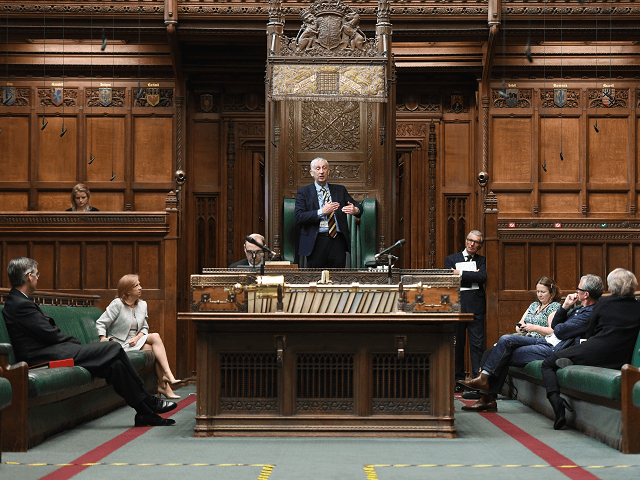The UK House of Commons has resumed its business with a digital hybrid chamber reportedly powered by Zoom, the popular video conferencing service shunned by U.S. and Taiwanese lawmakers over security concerns.
While Britain’s House of Commons is cramped by design — it has 427 seats for 650 members, said to be a deliberate decision to make crowded sittings feel more urgent and momentous — the new coronavirus parliament is forcing members to give each other personal space. Limiting those allowed to be physically present to 50 out of 650 who should have the right to sit, several rows of seating have been physically blocked with temporary wooden barriers.
"The House is meeting today in exceptional and unprecedented circumstances."
Watch today's statement from the Speaker here: https://t.co/iBRiKQrrzG pic.twitter.com/Rhurwlfnj1
— UK House of Commons (@HouseofCommons) April 21, 2020
Further seats on unblocked benches have been declared out of bounds with small ‘no entry’ stickers, with authorised sitting spaces denoted by a green tick.
The green carpets of the Commons have also been divided up with black and yellow hazard tape, adding a decidedly modern flourish to the more normal red stripes, which show the point at which no member from the government or opposition benches can advance beyond. The lines are set two swords’ length apart, a testimony to the passionate debates that took place in the chamber in the days when gentlemen generally went about carrying steel.
But perhaps the greatest intrusion into Britain’s historic lower chamber is the inclusion of several large television screens which will link to a live videoconference feed, allowing a further 120 members to participate in the debate from home. Even with the two methods combined, the new hybrid chamber will still be limited to just 170 members from a 650 member house to engage in any given debate.
Britain’s newspaper of record The Times, and several others reports the videoconferencing element of the digital hybrid chamber is being provided by Zoom, an app which has surged in popularity during the course of the coronavirus lockdown, but has been the subject to repeated concerns about security and privacy.
Members of staff were in the House of Commons Chamber today to rehearse the new systems ahead of tomorrow.
Here are some photos from today. Follow us on Instagram to see more: https://t.co/JJD0Q2Gr5h
Image credit: UK Parliament/Jessica Taylor pic.twitter.com/KHhj8qvB49
— UK House of Commons (@HouseofCommons) April 20, 2020
As Breitbart Tech reported this month, even Zoom’s own business partners expressed concerns about the company’s approach to security flaws. Alarmingly, investigations found multiple flaws and even when alerted to them, the company took months to fix problems.
While Zoom was developed by a U.S. company, some of the coding was subcontracted to programmers in China, and some user’s data has been routed through China during calls. Perhaps most concerning is the availability of Zoom software exploits which allow hackers to gain access to the computers of users, which an insider familiar with the process called “perfect for industrial espionage”.
While the proceedings of the House of Commons are in the public domain, and in normal times broadcast both online and on UK television, if the Zoom app is also used for other parliamentary business — for instance in Whip’s offices, where the internal business of Britain’s political parties is conducted — serious breaches of security could result. British members of parliament using Zoom apps could lead to further, and much more serious, breaches of security if unfriendly actors manage to use security flaws in the controversial software to install monitoring software on government laptops.
Concerns about Zoom being used by members of government are so pronounced the U.S. Senate is reported to have advised members to not use the service at all. The Taiwanese government has outright banned its own members from using Zoom at all, such is the concern of the obvious espionage issues of video traffic being routed through China.
According to a recent report, U.S. Intel Officials believe that foreign spies are targeting video chatting platforms such as Zoom to spy on business executives, government officials, and scientists using the apps during the Wuhan coronavirus pandemic. https://t.co/ief5ExELP3
— Breitbart News (@BreitbartNews) April 15, 2020
Security concerns aside, there are other problems to overcome with a digital-model parliament, not least remote digital voting, which is due to be debated next week and is likely to prove extremely controversial. In normal times members must be physically present to cast votes during debates, and many members are likely to be mindful that if remote voting is introduced now under the pretext of the coronavirus emergency, it is unlikely to ever be removed.
Britain’s Parliament can also be unusually rowdy and jostling compared to some other parliaments, a feature, not a fault of the British system. Speaking to Breitbart London, the speaker of the Isle of Man’s Tynwald, the world’s oldest parliament — which already went hybrid-digital earlier this month — noted the fact the 120 digital members being muted when not invited to speak could lead to very quiet sessions. Speaker Juan Watterson said: “…it is a real tangible problem.
“It is an important ability of politicians to ‘read the room’, which is impossible in a virtual chamber where you can’t see the body language… It’s certainly going to be hard for a new Opposition leader to make an effective mark when it will be harder for the public to know if he is really landing blows at PMQs.”
Nevertheless, speaker Watterson wished his UK Commons counterpart Sir Lyndsay Hoyle well, noting: “Chairing a virtual meeting is a whole new art form!”

COMMENTS
Please let us know if you're having issues with commenting.